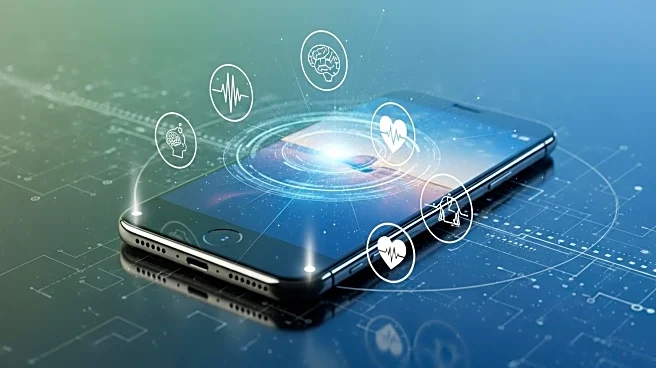What is the story about?
What's Happening?
Researchers from the University of Pittsburgh and the University of Minnesota are investigating the potential of smartphone sensors to detect behaviors associated with various mental health disorders. The study, led by Colin E. Vize and Whitney Ringwald, explores how passive data collection from cell phone sensors can identify symptoms linked to disorders such as agoraphobia, generalized anxiety disorder, and narcissistic personality disorder. The research aims to broaden the scope of how clinicians might use this data to enhance patient treatment. The findings, published in JAMA Network Open, suggest that sensor data can correlate with a range of mental health symptoms, offering a more comprehensive understanding of patient behaviors beyond traditional self-assessments.
Why It's Important?
The study's implications are significant for the future of mental health treatment. By utilizing smartphone sensors, clinicians could gain access to more reliable and extensive data about patients' daily lives, potentially improving diagnosis and treatment strategies. This approach could address the limitations of self-reported assessments, which often suffer from inaccuracies due to forgetfulness or subjective bias. The ability to passively collect data could lead to more personalized and effective mental health care, benefiting patients who exhibit symptoms that do not fit neatly into existing disorder categories. However, researchers caution that this technology is not intended to replace human clinicians but rather to supplement existing clinical care.
What's Next?
Further research is needed to refine the use of smartphone sensor data in clinical settings. The current findings are based on averages and do not provide individual diagnoses, highlighting the complexity of mental health and the variability of human behavior. Researchers aim to develop tools that can enhance clinical care by providing additional insights into patient symptoms. The integration of this technology into mental health treatment will require careful consideration of ethical and privacy concerns, as well as collaboration between technologists and healthcare professionals to ensure its effective and responsible use.
Beyond the Headlines
The exploration of smartphone sensors in mental health care raises important ethical and privacy questions. The passive collection of data from personal devices must be managed with strict confidentiality and consent protocols to protect patient privacy. Additionally, the reliance on technology in mental health treatment could lead to disparities in access, as not all patients may have smartphones or be comfortable with digital monitoring. These considerations must be addressed to ensure equitable and ethical implementation of this promising technology.

















